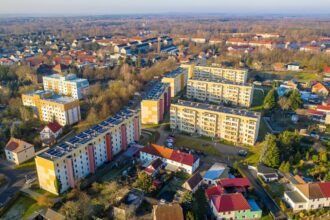Among the myriad challenges faced by businesses, property maintenance might seem like a mundane task, often overlooked in the pursuit of greater goals. However, what many fail to recognize is that proactive property maintenance isn’t just about fixing leaky roofs or repainting walls—it’s an indispensable strategy that can safeguard your investments and boost your bottom line.
In this blog post, we will unravel the transformative power of proactive business property maintenance, exploring how it not only preserves the physical integrity of your assets but also enhances their market value and, ultimately, secures the future of your business endeavors. Let’s embark on a journey where diligence meets dollars and where the seeds of proactive maintenance blossom into thriving, valuable assets.
Preserves Aesthetic Appeal
Maintaining the visual allure of your commercial property is pivotal for making a lasting impression on clients and customers. Regular upkeep, including exterior painting, landscaping, and the condition of the building’s façade, plays a vital role in enhancing your property’s curb appeal.
When it comes to maintaining your property’s aesthetic charm, engaging the expertise of experts is crucial. For instance, commercial roofing experts can ensure that your property’s roof not only remains structurally sound but also complements the overall design and appearance of the building. By relying on experts, you can keep your structure in optimal condition, preventing unsightly leaks, damage, and structural issues that can diminish the property’s overall aesthetic appeal.
Prevents Costly Repairs
Proactive business property maintenance is a strategic approach that can save a substantial amount of money in the long term. By regularly inspecting and addressing issues before they escalate, businesses can avoid costly and unexpected repairs. Timely maintenance and upkeep help identify hidden problems like leaks, structural weaknesses, and equipment failures, allowing for their immediate remediation.
This preventive approach not only prevents the need for large-scale, expensive repairs but also minimizes disruptions to daily operations. With a proactive maintenance plan in place, businesses can allocate their financial resources more efficiently and avoid the financial burden of sudden, costly repairs that can strain budgets and impede growth.
Extends Asset Lifespan
Proactive business property maintenance isn’t just about fixing what’s broken; it’s about ensuring that assets reach their full potential lifespan. By identifying wear and tear early on and taking the necessary steps to address it, businesses can significantly extend the longevity of their assets, whether they be machinery, equipment, or the property itself.
Regular maintenance, including cleaning, lubrication, and repairs, prevents premature wear and breakdowns, ultimately reducing the need for costly replacements. This approach not only safeguards your initial investment but also optimizes your return on assets, proving to be a fiscally responsible and sustainable strategy for asset management in the long run.
Enhances Tenant Satisfaction
Well-maintained properties create an environment where tenants feel valued and secure. Regular upkeep ensures that facilities are functional, safe, and aesthetically pleasing, significantly enhancing the overall tenant experience. Satisfied tenants are more likely to renew leases, fostering long-term, stable income streams for property owners.
Additionally, contented tenants often become advocates, referring other businesses to lease space within the property. Their positive experiences amplify the property’s reputation, attracting quality tenants and creating a vibrant, thriving community within the commercial space. This symbiotic relationship between proactive maintenance and tenant satisfaction establishes a strong foundation for sustained success in the competitive real estate market.
Reduces Downtime and Disruption
Proactive business property maintenance is a powerful shield against unexpected disruptions and costly downtime. In industries where operational continuity is paramount, such as manufacturing and service sectors, minimizing interruptions is essential. Scheduled, regular maintenance activities are designed to catch potential issues before they escalate, averting sudden breakdowns and the associated downtime.
By mitigating unexpected operational hiccups, businesses can maintain their productivity and prevent revenue losses. This proactive approach ensures that the daily rhythm of work remains undisturbed, employees stay productive, and customer commitments are met, ultimately bolstering the bottom line and enhancing the overall resilience and competitiveness of the business in today’s dynamic marketplace.
Complies with Regulations
Staying on the right side of regulations and safety standards is a paramount responsibility for businesses, and proactive property maintenance is an indispensable tool in achieving compliance. Many industries and properties are subject to a web of legal requirements governing safety, environmental impact, and accessibility. Regular, proactive maintenance ensures that a business property consistently adheres to these regulations.
Failure to comply can result in fines, legal challenges, and reputational damage. By investing in a proactive maintenance strategy, businesses not only prevent these potential pitfalls but also demonstrate a commitment to social and environmental responsibility, enhancing their standing in the eyes of customers, investors, and regulators alike.
Proactive business property maintenance is a strategic investment that yields multiple benefits. It safeguards assets by preventing costly repairs and extending their lifespan, thereby optimizing financial resources. Moreover, it enhances tenant satisfaction, fostering tenant loyalty and attracting new occupants. By reducing downtime and ensuring regulatory compliance, proactive maintenance bolsters a business’s operational resilience and reputation. In a competitive and dynamic business environment, the value of proactive property maintenance cannot be overstated, offering a path to sustained success and growth.













